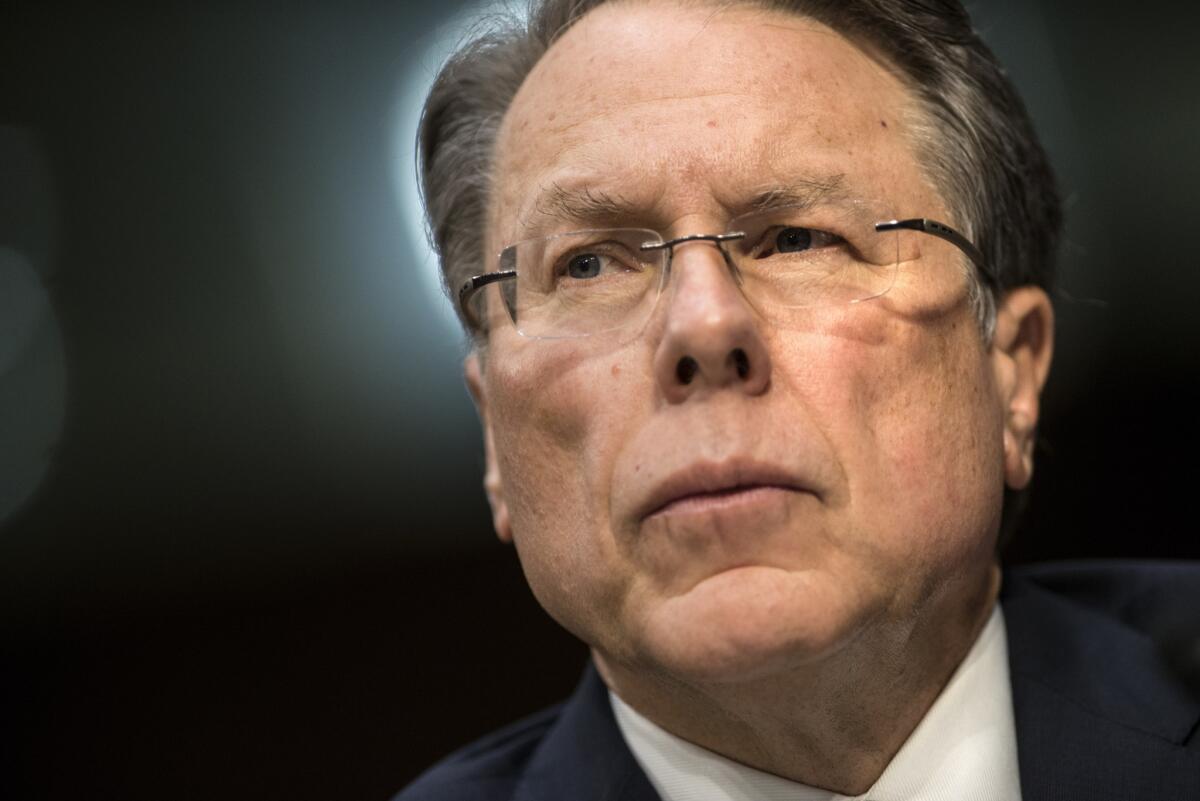Witnesses agree on the right to own guns, not much else in Senate

- Share via
WASHINGTON – National Rifle Assn. executive Wayne LaPierre and gun safety advocate Capt. Mark Kelly echoed a shared theme to a Senate panel on guns Wednesday: gun ownership is a right.
But they, and other witnesses, diverged significantly on how that right should be regulated, underscoring the challenge of finding common ground in legislation to reduce gun violence.
Kelly, whose wife, former Rep. Gabrielle Giffords, made an unscheduled appearance at the start of the hearing, said his perspective on guns is informed as someone affected by gun violence and as a gun owner.
He began his remarks by recounting the lasting impacts of Giffords’ injuries, sustained two years ago in a mass shooting in Tucson. “Gabby’s gift for speech is a distant memory,” he said. “She struggles to walk, and she is partially blind. Her right arm is completely paralyzed.”
But he also emphasized his belief that the 2nd Amendment gives individuals the right to own a firearm. “We take that right very seriously, and we would never, ever give it up,” he said.
“Our rights are paramount. But our responsibilities are serious,” Kelly continued. “And as a nation, we are not taking responsibility for the gun rights our founders conferred upon us.”
Kelly called for more stringent background checks, removal of limitations on federal public health research on guns and a federal gun trafficking statute.
He also advocated “a careful and civil conversation” about the lethality of available firearms, such as semiautomatic assault weapons and high-capacity ammunition magazines, but he stopped short of endorsing a ban like the one introduced last week by Sen. Dianne Feinstein (D-Calif.).
At the other end of the witness table sat the hearing’s other high-profile witness: LaPierre, who also couched his organization’s stance in the language of rights.
“We’re the millions from all walks of life who take responsibility for our own safety and protection as a God-given, fundamental right,” said LaPierre, the organization’s executive vice president.
LaPierre said some of the key gun provisions Congress is now considering – universal background checks and a ban on assault weapons – “only serve to burden the law-abiding [and] have failed in the past and will fail in the future.”
He instead urged tougher prosecutions of laws already on the books; he also endorsed armed guards in schools, an initiative the NRA unveiled one week after the mass shooting at Sandy Hook Elementary School in Newtown, Conn., last month.
Of the three other witnesses appearing before the panel, two testified against stricter gun laws. Gayle Trotter, an attorney with the Independent Women’s Forum, argued that firearms make women safer in violent attacks. And David Kopel, a law professor at Denver University and a policy analyst at the libertarian Cato Institute, said the best way to save lives was to institute “lawful armed self-defense in the schools, not only by armed guard but also by teachers.”
Universal background checks, Kopel said, are perilous because “universal background checks can only be enforceable if there is universal gun registration.” Registration, he said, paves the way for gun confiscation.
But another witness, Baltimore County Police Chief Jim Johnson, countered that “background checks work” in stopping prohibited purchases of firearms.
“Extending background checks to all firearm purchasers can be easily implemented – and should be, without delay,” he said.
Follow Politics Now on Twitter and Facebook
Twitter: @melmason
More to Read
Get the L.A. Times Politics newsletter
Deeply reported insights into legislation, politics and policy from Sacramento, Washington and beyond. In your inbox three times per week.
You may occasionally receive promotional content from the Los Angeles Times.











